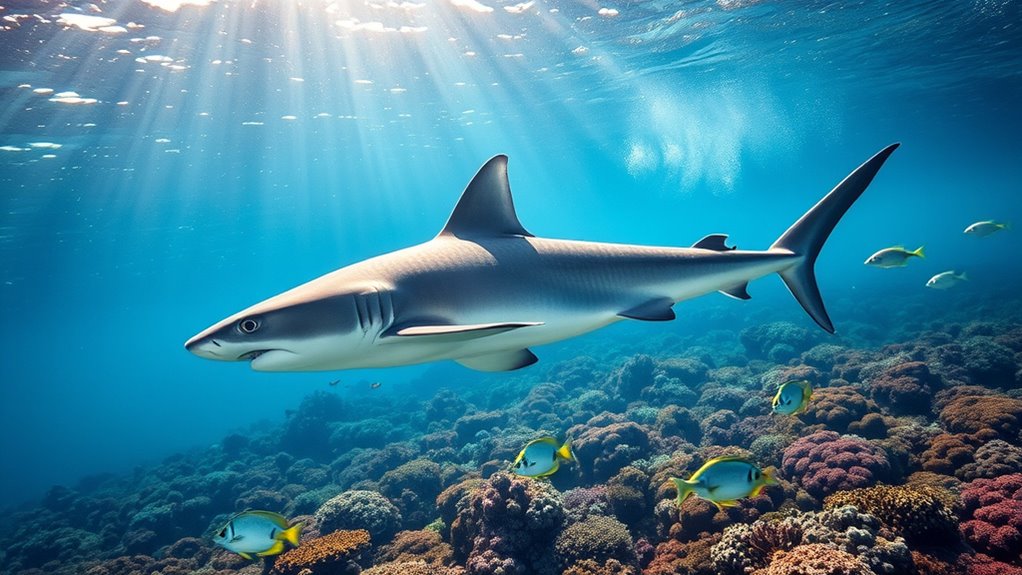Sharks are definitely fish, not mammals. They belong to a group called elasmobranchs, which also includes rays and skates. Unlike mammals, sharks don’t have lungs; they breathe through gills that extract oxygen from water. Their streamlined bodies and keen senses, including the ability to detect electrical fields, make them effective hunters. Understanding their classification opens up a fascinating world of ocean life, so keep exploring to learn more about these incredible creatures.
Key Takeaways
- Sharks are classified as fish, specifically belonging to the group of elasmobranchs, which also includes rays and skates.
- Unlike mammals, sharks breathe through gills that extract oxygen from water, not through lungs.
- Sharks have a streamlined body shape, which enhances their movement efficiency in the ocean.
- They possess unique adaptations, such as the ampullae of Lorenzini, which detect electrical fields produced by other creatures.
- Sharks have existed for over 400 million years and are considered top predators in ocean ecosystems.

Have you ever wondered whether sharks are fish or mammals? This question often sparks debate among ocean enthusiasts and casual observers alike. To clarify, sharks are classified as fish. More specifically, they belong to a group called elasmobranchs, which also includes rays and skates. Unlike mammals, sharks don’t have lungs; instead, they breathe through gills that extract oxygen from water. Their bodies are designed for life in the ocean, featuring a streamlined shape that allows them to glide through the water with minimal resistance.
Sharks are fascinating fish, belonging to the elasmobranch group, with unique adaptations for ocean life.
Understanding shark hunting behaviors can shed light on their evolutionary history, revealing how these creatures have adapted to survive in a diverse range of marine environments. Sharks are equipped with keen senses, including excellent vision and a special organ called the ampullae of Lorenzini, which detects electrical fields produced by other creatures. These adaptations make them formidable hunters, capable of locating prey even in murky waters or at great depths.
Sharks employ various strategies when hunting. Some species, like the great white shark, use a technique known as breach hunting, where they swim rapidly towards their prey from below and leap out of the water to catch it off guard. Others, such as the hammerhead shark, rely on their unique head shape to improve their ability to detect prey. Each species showcases a distinct hunting behavior, tailored to its specific environment and available food sources. This diversity in behavior reflects millions of years of evolutionary refinement.
Shark evolutionary history is fascinating and complex. Sharks have existed for over 400 million years, dating back to a time when the Earth was a vastly different place. They’ve survived mass extinctions and adapted to changing ocean conditions, cementing their place as one of the ocean’s top predators. Their evolutionary lineage separates them from mammals, highlighting their unique adaptations, including cartilage instead of bones and a reproduction method that varies widely among species. In addition to their biological distinctions, sharks also play a critical role in ocean ecosystems, maintaining the balance of marine life and influencing food webs.
Frequently Asked Questions
How Do Sharks Breathe Underwater?
Sharks breathe underwater using specialized respiratory systems called gills. When you look at a shark, you’ll notice it takes in water through its mouth and pushes it out through its gill slits. This allows the oxygen in the water to diffuse into its bloodstream while carbon dioxide is expelled. Their efficient underwater breathing mechanisms enable them to thrive in various aquatic environments, ensuring they get the oxygen they need to survive.
What Do Sharks Eat in the Wild?
In the wild, sharks have a diverse diet that varies by species. You’ll find them hunting everything from small fish and squid to larger prey like seals and even other sharks. Their hunting skills are impressive; they use speed and stealth to ambush their meals. This shark diet diversity helps them adapt to different environments and guarantees they thrive in various ocean habitats. So, when you think of sharks, imagine their role as apex predators.
How Long Can Sharks Live?
Sharks can live anywhere from 20 to over 100 years, much like wise old trees standing tall through seasons. Their shark lifespan depends on various longevity factors, including species, environment, and diet. For instance, the great white might reach 70 years, while the Greenland shark surprises with its century-long existence. By understanding their lives, you can appreciate these majestic creatures and the delicate balance they maintain in our oceans.
Are Sharks Endangered Species?
Yes, sharks are considered endangered species. You might be surprised to learn that overfishing and habitat loss threaten their populations. Shark conservation efforts, like establishing marine protected areas, are vital in helping these magnificent creatures recover. By supporting these initiatives, you can play a part in preserving the delicate balance of marine ecosystems. Every action counts, so get involved and help guarantee that future generations can enjoy the wonders of sharks in our oceans.
Can Sharks Be Kept in Aquariums?
Yes, you can keep sharks in aquariums, but you need a proper shark tank setup. It’s vital to choose a spacious tank with adequate filtration and water quality to mimic their natural habitat. Regular aquarium maintenance, like monitoring salinity and pH levels, is essential for their health. Remember, not all shark species are suitable for home aquariums, so research the specific type you’re interested in before setting up your tank.
Conclusion
In the grand scheme of the ocean, sharks are undeniably fish, not mammals. With their gills and fins, they glide through the water like a well-oiled machine, showcasing their unique adaptations. So, next time you think about these magnificent creatures, remember they’re not the cuddly types you’d find on land. Instead, they’re the kings of the sea, swimming in their element and ruling their underwater domain with grace and power.









